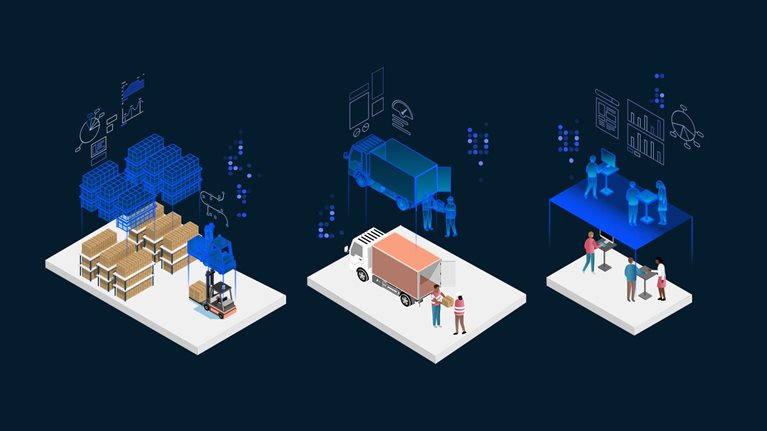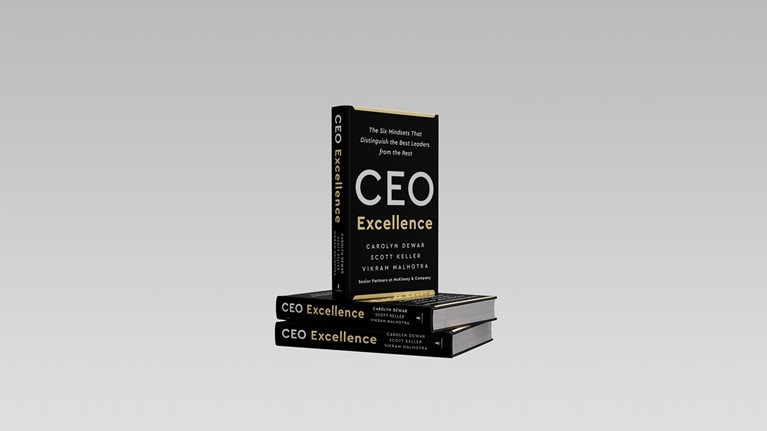The Weekend Read
Your Friday launchpad. End the week with our best reads on the trends and ideas shaping business and leadership, curated by McKinsey editors to prepare you for Monday.
The Great Ownership Transfer, the State of Organizations 2026, and more
-
As you head into the weekend, catch up on the week’s highlights including the “Great Ownership Transfer,” the latest State of Organizations research, a case study on Entel Connect Center’s agentic AI transformation, and more.
M&A trends in 2026, the economic gains of investing in health, understanding competitive advantage, and more
-
Catch up on the week’s highlights including M&A trends in 2026, the economic gains of investing in health, understanding competitive advantage, and more.
CIOs as strategy architects, private equity in 2026, the future of metabolic health, and more
-
As you head into the weekend, read up on the week’s big insights about the CIO’s role as strategy architect, private equity in 2026, the future of metabolic health, and more.
AI in insurance, moving beyond the ‘B+ life,’ CEO succession planning for family-owned businesses, and more
-
Get ready for the week ahead with new insights on AI in insurance, moving beyond the “B+ life,” succession planning for family-owned businesses, and more.
How top CEOs are getting AI right, learning from disruptor brands, and more
-
Check out this week’s fresh perspectives on how CEOs are meeting the AI moment, what consumer-packaged-goods companies can learn from disruptor brands, the latest Five Fifty, and more.
Transforming Europe’s future, unlocking economic growth in Latin America, and more
-
As this year’s WEF Annual Meeting in Davos comes to a close, catch up with our newest insights on the meeting’s priority themes, including perspectives on Europe’s competitiveness and investment gap, unlocking economic growth in Latin America with AI, the importance of brain health, and more.
Human leadership in the age of AI, new research on global cooperation, and more
-
Are you ready for some weekend reading? Ahead of the World Economic Forum Annual Meeting in Davos next week, explore highlights on human leadership in the age of AI, new research on global cooperation, and more.
Countdown to Davos, workplace health interventions, and more
-
As we kick off the new year, explore fresh insights on Davos 2026, workplace health interventions, location-based entertainment, and more.
Our year in review, top 100 interviews, and more
-
As the year draws to a close, catch up on the week’s highlights—from McKinsey Global Publishing’s year in review to the 100 best interviews of 2025 to how boards can evolve in the age of AI, and more.
The AI reckoning, six pillars of trade agreements, and more: The Weekend Read
-
Ease into the weekend with these insights and learn more about women’s experiences at work, new trade opportunities for businesses, how to develop a new generation of risk leaders, and more.
Global supply chain complexities, agentic AI in banking, and more: The Weekend Read
-
As you head into the first weekend of December, check out the week’s highlights on leading a successful digital transformation, putting agentic AI to work, navigating the latest on tariffs, and more.
How CEOs can lead amid geopolitical upheaval, using AI in operations, digital autonomy, and more: The Weekend Read
-
As you head into the weekend, catch up on the week’s standout stories on leading through geopolitical upheaval, leveraging AI in operations, enhancing digital autonomy, and more.
The State of Fashion, radical reinvention, and more: The Weekend Read
-
Ease into the weekend with the week’s big insights on the state of fashion, meeting the challenge of radical reinvention, and more.
The state of AI in 2025, agentic AI in the auto finance industry, and more: The Weekend Read
-
Unwind and get inspired this weekend by catching up on the week’s highlights, including the state of AI in 2025, agentic AI in the auto finance industry, the outlook for real estate and infrastructure, and more.
AI for finance, what’s next for airports, the latest on the global economy, and more: The Weekend Read
-
Get cozy this weekend with some of the week’s big reads on AI in finance, what’s next for airports, the latest on the global economy, and more.
An interview with Delta CEO Ed Bastian, McKinsey’s Global Banking Annual Review 2025, geopolitics in Asia, and more: The Weekend Read
-
As you head into the weekend and the start of November, take a moment to explore some of our newest insights, including an interview with Delta CEO Ed Bastian, McKinsey’s Global Banking Annual Review 2025, and more.
Agentic commerce, rewiring martech, the latest Five Fifty, and more: The Weekend Read
-
Ease into the weekend with the week’s must-read insights on agentic commerce, enterprise tech, the latest Five Fifty, and more.
The CEO agenda in the agentic age, Latino sports fandom, the future of air travel, and more: The Weekend Read
-
Ready for the weekend? Find some time to catch up on the week’s highlights, from the CEO’s agenda in the agentic age and Latino sports fandom to the future of air travel, and more.
Agentic AI, merging work and learning, the future of self-driving cars, and more: The Weekend Read
-
We’ve made it to October. Celebrate the start of the new month by catching up on the week’s highlights on overcoming agentic AI growing pains, merging work and learning, the future of self-driving cars, and more.
Scaling brain health interventions, CO2 removal, the FDI shake-up, and more: The Weekend Read
-
As we approach the final weekend of September, be sure to check out the week’s big insights on scaling brain health interventions, CO2 removal, the FDI shake-up, and more.
Improving global health, travel with agentic AI, the latest spotlight on geopolitics, and more: The Weekend Read
-
As you head into the weekend, catch up on some of the week’s highlights on investing in addressing noncommunicable diseases, travel with agentic AI, the latest spotlight on geopolitics, and more.
Learning from top CEOs, the infrastructure moment, holiday shopping, and more: The Weekend Read
-
As you wrap up the work week, get updated on the week’s big insights on mastering each season of leadership, the infrastructure moment, holiday shopping, and more.
CEO blind spots, how tech leaders can navigate uncertainty, the global beauty industry in 2025, and more: The Weekend Read
-
September is here. Are you ready for a new season? This weekend, catch up on recent highlights on CEO blind spots, how tech leaders can navigate uncertainty, the global beauty industry in 2025, and more.
Our future on the planet, women’s sports, risk transfer, and more: The Weekend Read
-
Soak up the remaining days of August and get caught up on the week’s highlights on the future of our place on the planet, women’s sports, risk transfer, and more.
The Black maternal-health gap, change management in the age of gen AI, fighting financial crime with agentic AI, and more: The Weekend Read
-
The dog days of summer are upon us in the Northern Hemisphere. Stay cool this weekend by catching up on recent insights on the Black maternal-health gap, change management in the age of gen AI, fighting financial crime with agentic AI, and more.
Rural America’s potential, operating model transformations, plus this week’s spotlight on geopolitics, and more: The Weekend Read
-
This weekend, dive into recent highlights on rural America’s potential and operating model transformations, plus this week’s spotlight on geopolitics, data centers with smarter designs, and more.
New operating models, private equity practices, this week’s spotlight on geopolitics, and more: The Weekend Read
-
As July comes to a close and we kick off August, take some time to catch up on McKinsey’s latest insights on new operating models, biopharma’s approach to AI, budgeting strategies, and what public boards can learn from private equity practices—plus our weekly spotlight on geopolitics.
Technology Trends Outlook 2025, the tech-enabled consumer sector, geopolitics, and more: The Weekend Read
-
Get ready for the weekend with 2025’s Technology Trends Outlook, the latest updates on geopolitics, the tech-enabled consumer sector, and more.
Strategy Champions, AI in asset management, this week’s spotlight on geopolitics, and more: The Weekend Read
-
Get ready to unwind and catch up on the week’s highlights on Strategy Champions, AI in asset management, this week’s spotlight on geopolitics, and more.
This year’s book recommendations, accelerating AI adoption, why learning to code still matters, and more: The Weekend Read
-
This weekend, soak up the sun and catch up on the week’s big insights on accelerating AI adoption, why learning to code still matters, plus our annual book recommendations, weekly spotlight on geopolitics, and more.
The AI innovation revolution, the affordable-housing market, this week’s spotlight on geopolitics, and more: The Weekend Read
-
As we near the end of June, finish strong with some intentional reading. This week’s highlights offer insights on the AI innovation revolution, affordable housing, and the great trade rearrangement—plus our weekly spotlight on geopolitics, and more.
The CMO’s comeback, geopolitically motivated investment controls, the price of decarbonization, and more: The Weekend Read
-
As you wrap up the work week and head into the weekend, dive into this week’s highlights on the CMO’s comeback, geopolitically motivated investment controls, the price of decarbonization, and more.
The state of the consumer in 2025, the ‘attention equation,’ the latest spotlight on geopolitics, and more: The Weekend Read
-
Are you ready for the weekend? Get updated on the week’s big insights on the state of the consumer in 2025, the “attention equation,” the latest spotlight on geopolitics, and more.
AI agents, senior housing, a new weekly spotlight on geopolitics, and more: The Weekend Read
-
Take a breather this weekend and dive into the week’s highlights on AI agents, senior housing, sustainable packaging, plus a new weekly spotlight on geopolitics, and more.
The state of aviation, geopolitical resilience, tariffs in the semiconductor industry, and more: The Weekend Read
-
Catch up on the week’s highlights this weekend including insights on the state of aviation, geopolitical resilience, tariffs in the semiconductor industry, and more.
Women CEOs, metabolic health, the latest Global Private Markets Report, and more: The Weekend Read
-
Memorial Day weekend—the unofficial start of summer—is coming up in the US. Take a breather this long weekend and dive into insights on women CEOs, metabolic health, the latest Global Private Markets Report, and more.
The 2024 sustainable and inclusive growth report, the upskilling imperative, closing the healthcare worker shortage gap, and more highlights
-
Start your weekend by being caught up on the week’s big reads, including the 2024 sustainable and inclusive growth report, the upskilling imperative, closing the healthcare worker shortage gap, and more.
How CEOs can build resilience, the power of one, revolutionary breakthroughs that propel growth, and more: The Weekend Read
-
As you head into the weekend, get updated on the week’s big insights on how CEOs can build resilience, the power of one, revolutionary breakthroughs that propel growth, and more.
Holistic health in America, US energy demand, investing in compute power, and more: The Weekend Read
-
Slide into the weekend and catch up on the week’s highlights on holistic health in America, US energy demand, investing in compute power, and more.
America at 250, semiconductors, the latest Five Fifty, and more: The Weekend Read
-
Spring is in the air in the Northern Hemisphere. This weekend, catch up on the week’s highlights on America at 250, semiconductors, the latest Five Fifty, and more.
Navigating tariffs, the US retirement industry, the State of Fashion in 2025, and more: The Weekend Read
-
Get ready for the weekend by taking a breather and diving into the week’s big insights on navigating tariffs, the US retirement industry, the State of Fashion in 2025, and more.
What’s in store for the European grocery sector this year?
-
Find a moment to unwind from the week and get updated on insights including the state of the European grocery sector in 2025, stepping over the “broken rung,” leadership in the public sector, and more.
Climate-driven growth businesses, thematic investing, the broken rung, and more: The Weekend Read
-
As we approach the weekend, find some time to relax and unwind with reads on climate-driven growth businesses, thematic investing, the broken rung, and more.
Employee health, B2B growth through gen AI, semiconductors in the US, and more: The Weekend Read
-
Ease into the weekend with the week’s highlights on employee health, B2B growth through gen AI, semiconductors in the US, and more.
Strategic resilience in the auto industry, how fashion can reduce Tier 2 emissions, the latest Five Fifty, and more: The Weekend Read
-
Spring has officially sprung in the northern hemisphere. Soak in the week’s highlights on strategic resilience in the auto industry, how fashion can reduce Tier 2 emissions, the latest Five Fifty, and more.
How organizations are capturing value from gen AI, recipes for growth at mobility companies, operations insights for 2025, and more: The Weekend Read
-
Are you ready for the weekend? Be sure to take some time to check out this week’s big insights on how organizations are rewiring to capture value from gen AI, recipes for growth at mobility companies, operations insights for 2025, and more.
The sporting goods industry in 2025, improving senior-housing options, New York 2040, and more: The Weekend Read
-
Take a breather this weekend and catch up on the week’s big insights on the sporting goods industry, improving senior-housing options, New York 2040, and more.
Strategic workforce planning, the gender pay gap, mass adoption of gen AI, and more: The Weekend Read
-
As we head into March, spend the weekend diving into some of the week’s highlights on strategic workforce planning, the gender pay gap, mass adoption of gen AI, and more.
Navigate the global M&A environment in 2025
-
As you wrap up the workweek and head into the weekend, catch up on recent insights on the global M&A environment in 2025, creating workplaces that help alleviate employee burnout, building leaders from the ground up, and more.
AI in Action, improving economic mobility for all, using innovation to grow, and more: The Weekend Read
-
This weekend, get updated on the week’s big insights on AI in Action, improving economic mobility for all, using innovation to grow, and more.
Economic mobility, how AI is transforming strategy, collectible cars, and more: The Weekend Read
-
February is upon us. Whether you’re gearing up for the Big Game in the US or taking it easy this weekend, take a moment to get caught up on the week’s highlights on economic mobility, how AI is transforming strategy, collectible cars, and more.
AI superagency, the next frontier of personalized marketing, global trade, and more highlights
-
The weekend is near; what are your plans? Find some time to unwind and catch up on the week’s big insights on AI superagency, the next frontier of personalized marketing, global trade, and more.
A resilience pulse check, the women’s health gap, real estate and AI, and more: The Weekend Read
-
We’ve made it to the end of the week. Slide into the weekend with the week’s big reads on a resilience pulse check, the women’s health gap, real estate and AI, and more.
Getting fit for growth, navigating geopolitical uncertainty, a new demographic reality, and more: The Weekend Read
-
Get cozy this weekend and catch up on the week’s highlights on getting fit for growth, navigating geopolitical uncertainty, a new demographic reality, and more.
Technology priorities for 2025, gen AI for beauty brands, how companies can benefit more people, and more: The Weekend Read
-
Happy New Year! As we ease into 2025, get caught up on the week’s big insights on technology priorities for 2025, gen AI for beauty brands, how companies can benefit more people, and more.
Generosity in leadership, business travel, the people agenda for geopolitics, and more: The Weekend Read
-
The holidays are just around the corner. This weekend, take a break from the hustle and bustle and dive into the week’s highlights on generosity in leadership, business travel, the people agenda for geopolitics, and more.
McKinsey’s best insights of 2024, making the internet more accessible, AI in banking, and more: The Weekend Read
-
This weekend, get cozy with the week’s highlights on McKinsey’s best insights of 2024, making the internet more accessible, AI in banking, and more.
Unconventional partnerships in real estate, Tony Blair on successful leadership, AI for IT modernization, and more insights: The Weekend Read
-
We’re heading into the homestretch of 2024. This weekend, dive into the week’s big insights on unconventional partnerships in real estate, tips for successful leadership, applying gen AI for IT modernization, and more.
McKinsey’s gen AI platform, your personal operating model, the latest Global Economics Intelligence executive summary, and more: The Weekend Read
-
As we head into the last month of the year, catch up on some recent highlights on McKinsey’s generative AI platform, upgrading your personal operating model, the latest Global Economics Intelligence executive summary, and more.
McKinsey’s Global Insurance Report 2025, digital twins, year-end reviews, and more: The Weekend Read
-
As we wrap up the workweek, take a breather and dive into the week’s big reads on global insurance, digital twins, year-end reviews, and more.
Navigating geopolitics, checklist for CEOs, the State of Fashion 2025, and more: The Weekend Read
-
This weekend, catch up on the week’s big insights on navigating geopolitics, the essential checklist for CEOs, the State of Fashion 2025, and more.
The power of vulnerability, an AI-powered finance function, private brands, and more: The Weekend Read
-
Ease into the weekend with the week’s highlights on the power of vulnerability, an AI-powered finance function, private brands, and more.
Team effectiveness, the impact of Hurricanes Helene and Milton, Daniel Kahneman, and more highlights
-
Get ready for the weekend—and the start of a new month—by diving into the week’s big insights on team effectiveness, the impact of Hurricanes Helene and Milton, Daniel Kahneman, and more.
The art of 21st-century leadership, corporate venture building, arenas of competition, and more highlights
-
Get ready for the weekend by diving into the week’s big insights on the art of 21st-century leadership, corporate venture building, arenas of competition, and more.
This year’s Global Banking Annual Review, data centers in real estate, rewiring for the era of gen AI, and more: The Weekend Read
-
Get cozy this weekend and fall into the week’s highlights on this year’s Global Banking Annual Review, data centers in real estate, rewiring for the era of gen AI, and more.
An interview with Anna Koivuniemi of Google DeepMind, embracing the CEO role, next-gen e-commerce, and more highlights
-
The weekend awaits so find a moment to relax and catch up on this week’s big insights on the benefits of AI, embracing the CEO role, next-gen e-commerce, and more.
America’s small businesses, the airline retailing opportunity, the economic potential of EVs in Europe, and more: The Weekend Read
-
What are your weekend plans? Take a moment to relax and catch up on the week’s big insights on America’s small businesses, the airline retailing opportunity, the economic potential of EVs in Europe, and more.
A human-centric approach to CEO leadership, board–CEO collaboration, inclusive care for people with disabilities, and more: The Weekend Read
-
It’s officially fall in the Northern hemisphere. Get cozy this weekend and catch up on some of the week’s big reads on a human-centric approach to CEO leadership, boosting board–CEO collaboration, inclusive care pathways for people with disabilities, and more.
Women in the Workplace 2024, magical experiences in travel, neurodivergent employees, and more: The Weekend Read
-
As we wrap up another workweek and get ready for the weekend, catch up on the week’s highlights on the latest Women in the Workplace report, magical experiences in travel, Global Energy Perspective 2024, and more.
Technology officers, the beauty boom, global capability centers, and more insights for the weekend
-
Take a breather this weekend and dive into some highlights on technology officers, the beauty boom, addressing the physician shortage, and more.
New York as a global fashion capital, creating value in retail, the drive toward human development, and more
-
Are you ready to dive into September? In this inaugural issue of The Weekend Read—our new weekly newsletter replacing The Daily Read—we offer a diverse set of recent highlights to kick off the month. Read about New York’s status as a global fashion capital, creating value in retail, the drive toward human development, and more.
The key to accelerating AI development? Pragmatism plus imagination
-
The adoption of generative AI in the workplace is exponentially increasing, according to McKinsey research about the state of AI. But how can organizations accelerate AI development while mitigating the risks? In a new episode of The McKinsey Podcast, senior partners Alexander Sukharevsky and Lareina Yee discuss the importance of responsible AI governance, partnerships, and creative pragmatism.
Healthy organizations keep winning, but the rules are changing fast
-
Organizational health is a moving target. In the two decades since McKinsey launched the Organizational Health Index (OHI), many of the practices and outcomes that have defined organizational health have not changed. Yet the dynamics of the workplace have evolved.
Why agents are the next frontier of generative AI
-
Generative AI (gen AI) is rapidly evolving, and it’s about to take a major leap forward. We’ve witnessed the capabilities of gen AI across text, audio, images, and video over the past couple of years, and the next stage of gen AI is likely to be even more transformative.

Toward the long term: CFO perspectives on the future of finance
-
How are CFOs thinking about the future? Despite an increasingly unpredictable and volatile world, it’s important to look at what’s ahead. In McKinsey’s newest CFO pulse survey, respondents say they are focusing on the long term and expect digital technology, including generative AI, to play a key role in helping them navigate the current environment and create value.
McKinsey technology trends outlook 2024
-
What are the most significant technology trends unfolding in 2024? The latest McKinsey Technology Trends Outlook highlights the 15 most important trends identified by the McKinsey Technology Council that could have the greatest impact on companies today.
The 'evergreen economy': Harnessing the power of healthy longevity
-
More people around the world are growing older—and this increased life expectancy presents an opportunity for folks to live healthier and more productive lives, according to economist Andrew J. Scott. In a new McKinsey Health Institute interview, he speaks with McKinsey partner Ellen Feehan about the benefits of embracing healthy longevity and how the public, private, and social sectors can work together to stimulate an “evergreen economy.”
What you should read in 2024
-
McKinsey’s annual book recommendations list is back. Whether you are looking for a book to read over the upcoming July 4 holiday, or want a glimpse into the books that have made a lasting impression on leaders in business, media, and nonprofit, you’ll be sure to find something that interests you.
Building a superpower: What can we learn from the Magnificent Seven?
-
Some of the world’s most successful companies have built institutional capabilities that have created enduring competitive advantages—superpowers that make them uniquely successful and hard to replicate. These capabilities are often rooted in six elements—vision, employees, culture, technology, organizational structure, and routines.

A dual agenda for the consumer goods industry
-
Four megatrends have been stalling the consumer goods industry’s decades-long run of stable growth and healthy returns over the past ten years. What do leaders need to do to get back on track? In a new article, Jessica Moulton, Pavlos Exarchos, and Warren Teichner lay out six big moves consumer companies need to make to improve their portfolios and performance.
Last year’s consumer insights are so yesterday
-
Who are consumers today? It’s more difficult than ever to say. What you thought you knew is probably wrong, or at the very least outdated.
Five focus areas for banks to manage interest rate risk
-
The uncertainty in rates markets presents both risks and opportunities for the banking industry. But in the absence of recent precedent, many institutions lack the necessary playbook to tackle the challenge. To manage volatile interest rates, leading banks are revisiting practices of the past that may no longer be fit for purpose—or at least should be updated for the new environment, write McKinsey’s Andreas Bohn and coauthors.
The state of AI in early 2024: Gen AI adoption spikes and starts to generate value
-
How are organizations currently using generative AI? 2024 is proving to be the year organizations are truly embracing and gaining business value from this technology, write Alex Singla, Alexander Sukharevsky, Lareina Yee, Michael Chui, and Bryce Hall.
Bridging the women’s health gap: A country-level exploration
-
On average, women live longer than men—yet they spend 25% more time in poor health. This is due to disparities in efficacy, data, and care delivery, write Anouk Petersen, Lucy Pérez, and coauthors.
The new real estate investment edge: Tech-enabled brand, CX, and loyalty
-
How can real estate companies elevate the customer experience (CX) they offer tenants? Consumers today live in a world of nuanced brand identities and sophisticated loyalty programs, and their expectations and interaction preferences are changing across industries. In order to inspire customer loyalty, residential real estate companies must interact with customers in new and creative ways.
In search of self and something bigger: A spiritual health exploration
-
What is spiritual health and why does it matter? McKinsey Heath Institute’s concept of spiritual health is about having “meaning in one’s life, a broad sense of connection to something larger than oneself, and a strong sense of purpose,” which can be found within a community, a form of divinity, being mindful in the present moment, or all of the above.
How to keep and engage gen AI talent
-
Generative AI skills are in high demand—but those who are fluent in gen AI are more likely to quit their jobs than others. What can leaders do to keep these workers engaged and motivated to stay put? The answer is not compensation, say talent leaders Aaron De Smet and Brooke Weddle.
Why is incompetent leadership rewarded?
-
Decarbonization is the most critical response to climate change—but is it enough? McKinsey research shows that carbon dioxide removal, or CDR, could play a vital role in combating hard-to-abate emissions.
Everything you wanted to know about carbon removals but were afraid to ask
-
Decarbonization is the most critical response to climate change—but is it enough? McKinsey research shows that carbon dioxide removal, or CDR, could play a vital role in combating hard-to-abate emissions.
Six ways CFOs find the time to unlock their full potential
-
It’s not easy being a CFO—they not only are in charge of running a company’s finance function and executing its strategy, but also serve as a confidant and critical thought partner to the CEO. In the face of pressing and even competing demands in today’s complex business environment, how can they rise to the challenge and achieve real strategic impact? In a new article, Ankur Agrawal, Matthew Maloney, and coauthors lay out six ways CFOs can become enterprise-wide leaders, superior decision makers, and value-creating confidants of CEOs.
CEO priorities: Where to focus as the year unfolds
-
What should CEOs prioritize in 2024? Leaders continue to grapple with “an endless series of crises”—in the words of Homayoun Hatami, McKinsey’s managing partner for global client capabilities—that have left many wondering where to focus first. In a new episode of The McKinsey Podcast, Homayoun and McKinsey’s chief client officer Liz Hilton Segel talk about what matters most—from rising geopolitical risk to the energy transition to the promise and perils of gen AI—and how some of the best leaders are approaching these challenges to thrive as the year evolves. Be sure to tune in.
Members only: Delivering greater value through loyalty and pricing
-
Consumers today are demanding more from their favorite retailers. What can companies do to differentiate themselves in a crowded market? Combining loyalty tactics and pricing strategies through a fully personalized shopping experience could be one way to fuel future growth, write Emily Reasor and coauthors.
Scaling gen AI in banking: Choosing the best operating model
-
How important is a financial institution’s operating model when it comes to implementing generative AI? An operating model is a blueprint for how a company puts strategy into action and is a necessary foundation for scaling gen AI effectively. Financial institutions that successfully use gen AI have implemented tailored operating models that account for the technology’s nuances and risks, write Kevin Buehler and coauthors.
Working nine to thrive
-
The average person spends about a third of their life at work—that’s more than 90,000 hours in a lifetime. So it is no surprise that the workplace can play a major role in the health of its employees. In fact, improving employee health and well-being could create $3.7 trillion to $11.7 trillion in economic value, according to McKinsey Health Institute research.
Latinos in Hollywood: Amplifying voices, expanding horizons
-
Did you know that US Latinos account for more than $3 trillion of GDP? They are also the largest per capita consumers of media in the US. But according to McKinsey research, Latinos hold less than 5 percent of leading on-screen, off-screen, and executive management roles in US media—and addressing this gap is an opportunity worth an additional $12 billion to $18 billion in annual revenue for the industry, write Tomás Lajous, Lucy Pérez, and coauthors.
A generative AI reset: Rewiring to turn potential into value in 2024
-
Generative AI has been a top agenda item for many companies this past year, but they are realizing that capturing its value is harder than expected. Launching pilots is (relatively) easy; getting pilots to scale and create meaningful value is hard because they require a broad set of changes to the way work actually gets done. 2024 is the year for generative AI to prove its value, which will require companies to make more fundamental changes and rewire the business.
Strengthening fraying ties: The Global Cooperation Barometer 2024
-
One of the major takeaways from the World Economic Forum’s annual meeting, which took place in January in Davos, Switzerland, was the need to balance cooperation and competition. In today’s challenging geopolitical context, how do we make sense of a fragmenting global order amid heightened competition and conflict? To help leaders gain a better understanding of the broad global trends that impact billions of people around the world, McKinsey, in partnership with WEF, developed a Global Cooperation Barometer.
Top M&A trends in 2024: Blueprint for success in the next wave of deals
-
The global M&A market has had a volatile few years—there was the pandemic in 2020, followed by a record-breaking recovery in 2021, and a steep decline in 2023. What can dealmakers expect to see in 2024? In a new report, Jake Henry and Mieke Van Oostende look back at learnings from last year’s market performance amid macroeconomic, geopolitical, and regulatory challenges, and lay out what 2024 has in store for M&A.
Organizational health is (still) the key to long-term performance
-
In an era of unprecedented change, organizational health—or how effectively leaders “run the place”—is crucial amid geopolitical shocks, technological advances, economic uncertainty, competitors’ bold moves, and other disruptions. In a new article, McKinsey’s Alex Camp, Arne Gast, Drew Goldstein, and Brooke Weddle explore the latest findings from McKinsey’s Organizational Health Index (OHI), highlighting the importance of leadership style, data and technology, and talent management.
The state of Black residents: The relevance of place to racial equity and outcomes
-
What is the current state of Black Americans across different types of communities including cities, suburbs, and rural areas? Which environments offer Black residents the best quality of life? In a new report from the McKinsey Institute for Black Economic Mobility, JP Julien, Duwain Pinder, Shelley Stewart III, and coauthors take a deep dive into the experiences of Black residents across the US and assess their quality of life based on metrics such as standard of living, financial stability, job opportunities, stable and secure homes, and more.
How US states can advance a successful clean-energy transition
-
What role can US leaders at the state level play in the clean-energy transition? States have the unique opportunity to access financial support from the Inflation Reduction Act (IRA) and the Bipartisan Infrastructure Law (BIL) to achieve net-zero targets while supporting inclusive growth and improving energy affordability, write McKinsey senior partner Adi Kumar and coauthors.
How CEOs can mitigate compounding risks
-
Dealing with intersecting and high-stakes risks is an ongoing challenge for CEOs in today’s complex business environment. And when several shocks occur simultaneously, the cumulative effect can have existential consequences. “As complex, far-reaching risks mount, from geopolitical tensions to climate change, CEOs and boards cannot afford to be caught unprepared,” write McKinsey senior partner Celia Huber and coauthors. In a new article, they explain what compounding risks are and why they are often missed by risk management teams, CEOs, and boards.
Closing the women’s health gap: A $1 trillion opportunity to improve lives and economies
-
The World Economic Forum’s annual meeting in Davos is happening this week and women’s health is high on the agenda. New research from the World Economic Forum in collaboration with the McKinsey Health Institute and the McKinsey Global Institute shines a light on the additional time women spend in poor health than men, reducing both their quality of life and productivity.
How to transition out of the CEO role
-
As a CEO, when is the right time to transition out of the role? Making an effective exit can be complicated as CEOs must think about what is right for them, while also ensuring that the organization and the next generation of leaders are set up for success.
The impact of generative AI on Black communities
-
How will the advent of generative AI affect Black communities? Without correcting long-standing patterns, generative AI can widen the racial wealth gap for Black Americans—but it could also yield equitable benefits for Black and other marginalized groups if deployed thoughtfully.
What matters most? Eight CEO priorities for 2024
-
It’s no surprise that CEOs have endured a challenging operating environment these last few years due to the pandemic, wars, inflation, and many other disruptions. As we close out 2023 and head into the new year, what are the big priorities for chief executives in 2024?
Impacts of climate change on Black populations in the United States
-
Explore how extreme weather can put the prospect of Black livelihood, well-being, and socioeconomic mobility at greater risk.
The State of Fashion 2024: Finding pockets of growth as uncertainty reigns
-
Uncertainty: so hot right now. Looking toward 2024, the most prominent sentiment among fashion industry leaders is uncertainty, reflecting the prospect of subdued economic growth, persistent inflation, and weak consumer confidence. Even the luxury segment, although expected to generate the biggest share of economic profit, will have its challenges.
In search of cloud value: Can generative AI transform cloud ROI?
-
Is there anything gen AI can't do? Migrating to cloud has clear benefits to organizations of all sizes, but the scale of change required can make it difficult to get a good return on investment.
CEOs’ choice for growth: Building new businesses
-
Business leaders are seeing the value of building new businesses, even during these times of economic uncertainty, according to a recent McKinsey survey.
Innovative growers: A view from the top
-
Do innovative growers perform better than others? Research shows that innovative growers—or companies that consistently excel in both growth and innovation—achieved total shareholder returns (TSR) above their industry median between 2012 and 2022.
The power of partnership: How the CEO-CMO relationship can drive outsize growth
-
How important is collaboration between CEOs and CMOs when it comes to driving growth today? Research finds that 40 percent of Fortune 500 companies don’t have a single growth or customer-related role in their CEO’s executive committee.
Decarbonize and create value: How incumbents can tackle the steep challenge
-
A successful net-zero transition could present significant opportunities for the industrial sector, but decarbonization is a difficult transformation for most companies. The process is time-consuming, the costs for scaling climate technologies can be high, and access to financing can be challenging.
How to gain and sustain a competitive edge through transformation
-
As organizations around the world deal with change, what does it take for a transformation to be successful? How can organizations be set up for a true competitive advantage through a transformation? Findings from the latest McKinsey Global Survey reveal that a successful transformation involves four elements—will, skill, rigor, and scope.
What is the state of women in the workplace in 2023?
-
You may have heard that Claudia Goldin won the Nobel Memorial Prize in Economic Sciences for her research on the key drivers behind the gender pay gap. She is the third woman to be awarded the economics Nobel and the first woman to be the sole winner.
Funnel vision: Marketing with an investor mindset
-
It’s no surprise that when times get tough, marketing budgets are one of the first items on the chopping block. But when marketing is at its best, it can drive growth, says McKinsey senior partner Kelsey Robinson in a new episode of The McKinsey Podcast.
Generative AI: How will it affect future jobs and workflows?
-
What role will generative AI play in the future of work? What should we do now to ensure that employers and workers are prepared? Gen AI could automate almost 10 percent of tasks in the US economy, but there are also opportunities to empower employees through upskilling and reskilling, say McKinsey's Kweilin Ellingrud and Saurabh Sanghvi.
Full throttle on net zero: Creating value in the face of uncertainty
-
How can leaders create value in the net-zero transition amid challenges such as high energy prices, supply chain pressures, and increased interest rates? Companies that take disciplined and courageous action on both resilience and sustainability have a unique opportunity to differentiate themselves from organizations that focus on just the short-term shocks, or those that step back from their sustainability commitments, write McKinsey’s Laura Corb, Anna Granskog, Tomas Nauclér, and Daniel Pacthod.
Companies with innovative cultures have a big edge with generative AI
-
Innovation is the key to growth and resilience and companies that are ahead on new digital technologies like generative AI could help them stay ahead of the curve. But in a rapidly changing world, when and how innovative companies deploy gen AI is what distances them from their competitors.
From poverty to empowerment: Raising the bar for sustainable and inclusive growth
-
Growth, inclusion, and sustainability are all parts of a complex yet connected system. What would it take for these forces to work together to economically empower communities and contribute to a greener planet?
Don’t wait—create with generative AI
-
Generative AI has taken the world by storm over the past year. How can companies stay ahead of it? “Speed is often a strategy in and of itself. So those who run faster will win over time,” explains McKinsey senior partner Alex Singla.
The future of middle management
-
Middle managers are often underappreciated and the subjects of negative stereotypes in popular culture. They are viewed as cogs in an organization’s bureaucracy, whose primary job is to take directives from senior leadership and push paper. In reality, managers play a critical role in developing talent, promoting connectivity across teams, and creating value for organizations.
Generative AI and the future of work in America
-
Since the pandemic, the way we think about work has dramatically evolved—remote and hybrid work have become commonplace and companies are quickly adopting automation technologies such as generative AI. Meanwhile, a remarkable number of workers in the US are changing jobs—more than 8 million occupational shifts took place from 2019 through 2022 and an additional 12 million occupational shifts are expected by 2030. How should we make sense of all of this?
McKinsey’s 2023 summer reading guide
-
If you’re looking for book recommendations for your downtime or an upcoming vacation, this year’s summer reading guide has got you covered. Browse through 70-plus books in nine genres selected by CEOs, editors-in-chief, and other leaders, including McKinsey’s Bob Sternfels, Tracy Francis, Sven Smit, Homayoun Hatami, Pierre Gentin, Rodney Zemmel, and Joydeep Sengupta, and you’ll be sure to find something that satisfies your interests.
Four essential questions for boards to ask about generative AI
-
With generative AI developing at lightning speed, company executives and employees are anxiously exploring its possibilities, values, and risks. But what role should a company’s board of directors play to get ready for what lies ahead?
Race in the UK workplace: The intersectional experience
-
While efforts have been made to advance racial equity in the workplace, fair and equitable progress has been hard to achieve. In order to move the needle on racial equity, it is crucial that we understand the varying needs of different groups, in addition to individuals with multiple “identities.”
HR rewired: An end-to-end approach to attracting and retaining top tech talent
-
Technology companies are shedding the very talent that incumbent players need to meet their own digital objectives. Here’s what HR teams in traditional organizations can do to capitalize.
Rewired to outcompete in the age of digital and AI
-
With digital and AI reshaping the way we live and work, transforming the way companies operate is one of the most pressing business challenges today.
Generative AI and the next wave of productivity
-
AI has undoubtedly become a major force in our everyday lives. And with the recent rise and early adoption of generative AI, more and more people are grappling with how it will impact our work and society at large.
Mckinsey’s 2022 ESG Report: Creating a more sustainable, inclusive, and growing future for all
-
McKinsey’s long-term aspiration is to accelerate sustainable and inclusive growth for the world. That means the firm is committed to creating positive, enduring change in the societies where we live and work. Our 2022 ESG Report: Creating a More Sustainable, Inclusive, and Growing Future for All, which is now available for download, details our progress toward these commitments.
Generative AI and the future of HR
-
It’s hard to think of a new technological breakthrough in recent years that has captured the public’s imagination like generative AI. With so much buzz around tools like Chat GPT, many of us can’t help but wonder: what does this mean for our jobs?
Staying ahead: How the best CEOs continually improve performance
-
After the heady first years in the job, CEOs must sustain momentum and high performance. Here are four ways to avoid complacency and create even more value.
Age is just a number: How older adults view healthy aging
-
The results of a survey from the McKinsey Health Institute shed light on the health perceptions and priorities of people aged 55 and older.
It’s (past) time to get strategic about DEI
-
Organizations have taken lots of steps in recent years to become more diverse, equitable and inclusive—and still, change has been slow.
Capturing the value of ‘one firm’
-
You may be familiar with the idea of working as “one firm.” But while most leaders understand the importance of working together, capturing the full value of operating as one firm is elusive for most.
Gen Z mental health: The impact of tech and social media
-
Whether you love it or hate it, social media is a major force in our lives. And Gen Z’s relationship with it is particularly complicated.
Ten major shifts facing organizations today
-
Did you know that only 50% of business leaders believe their organization would be able to respond quickly to a crisis?
Space launch: Are we heading for oversupply or a shortfall?
-
In the future, the launch needs of satellites could further increase due to greater space exploration, the launch of commercial space stations, and tourism, say McKinsey’s Chris Daehnick, John Gang, and Ilan Rozenkopf in a new article.
Six CEO priorities for 2023
-
Leaders around the world are confronting a welter of uncertainties. Here’s how to home in on what matters—and begin making the most of novel opportunities—amid ongoing change.
Building the office of the future
-
JPMorgan Chase’s head of global real estate explains how and why the company is investing in tomorrow’s workplace.
Space: The missing element of your strategy
-
The space sector is at an inflection point similar to what commercial air travel experienced after World War II and the internet saw in the 1990s. Is your company ready to capture the opportunity?
Private markets turn down the volume
-
According to our latest Global Private Markets Review, private markets faced a year of two halves in 2022, with buoyancy in the first half and plummeting deal volumes, declining performance, and falling valuations in the second.
Actions the best CEOs are taking in 2023
-
Corporate leaders are addressing the risks while finding the opportunities in digital disruption, the economy, and geopolitical uncertainties.
Black swans, grey rhinos, and silver linings: Anticipating geopolitical risks (and openings) in a fragmenting global order
-
The need for board-level strategic conversations on geopolitical risk is urgent.
The executive’s guide to new-business building
-
During these times of economic volatility and uncertainty, many executives are prioritizing building new businesses as a way to boost growth and value to their organization.
Global Economics Intelligence executive summary, January 2023
-
What’s the latest on inflation, energy prices, and economic performance across the globe?
Consumers care about sustainability—and back it up with their wallets
-
Do consumers really care about buying environmentally and ethically sustainable products?
Net zero: Next moves for CEOs
-
How leaders can invest in a sustainable future and navigate near-term energy pressures successfully.
A CEO’s guide to the metaverse
-
It’s too big to ignore—yet its future is far from certain. Companies need to dip a toe in the water and plan to take the plunge should developments warrant.
Diversity, Equity, and Inclusion Lighthouses 2023
-
Leaders need clarity on what works to improve diversity, equity, and inclusion. Our 2023 report shows success factors that contributed to significant, quantifiable, scalable, and sustainable DEI impact.
New year’s resolutions for tech in 2023
-
McKinsey Technology leaders offer their insights on how business leaders can make the most of tech this year.
Digital transformations: The five talent factors that matter most
-
Setting up a winning digital and advanced-analytics organization is hard. Decisions about talent and technology will often determine the transformation’s success.
Business building: The path to resilience in uncertain times
-
In an uncertain economy, executives’ first instinct might be to cut costs and shore up established holdings. A better way is to build new businesses.
Pixels of Progress: A granular look at human development around the world
-
Our world is big and complex, but human progress is still about life on the ground, up close and in detail.
The state of AI in 2022—and a half decade in review
-
The results of this year’s McKinsey Global Survey on AI show the expansion of the technology’s use since we began tracking it five years ago, but with a nuanced picture underneath.
How will the space economy change the world?
-
Space is no longer the sole domain of governments and aerospace and defense companies. Businesses that pursue emerging opportunities now may gain a first mover advantage.
The gender leadership gap is replicating in the metaverse
-
Five early indicators on women in the metaverse reveal gender inequality—especially in the leadership creating and setting metaverse standards.
Starting strong: Making your CEO transition a catalyst for renewal
-
The best CEOs use the first six to 12 months of their tenure as a moment of great personal transition and institutional renewal. There are four keys to success.
Prioritizing brain health: Scaling what works to add years to life and life to years
-
How many more years can be spent in optimal health if our society viewed mental and substance-use disorders as we do other conditions? The McKinsey Health Institute and the Healthy Brains Global Initiative collaboration sought to answer this question through a series of interactives.
Why bad strategy is a ‘social contagion’
-
Business leaders are often focused on ambitions and achieving results—and less about developing an action plan, according to Richard Rumelt, professor at the UCLA Anderson School of Management.
Stepping up: What COOs will need to succeed in 2023 and beyond
-
Behind every great CEO, there’s a great COO. After a few years out of vogue—in 2018, only 32 percent of Fortune 500 companies had one—the COO is back in a big, bold way. Nearly half of Fortune 500 companies in the energy and financial sectors have COOs in 2022.
How Titanium Economy companies are driving innovation in the US
-
In recent years, companies in Silicon Valley have dominated headlines—and for good reason: they are among the best performing stocks of the past decade.
Women in the Workplace 2022
-
Did you know that for every 100 men promoted to managerial levels, only 87 women experience similar advancement?
Digital twins: The foundation of the enterprise metaverse
-
Put away your crystal ball. For enterprise organizations, the metaverse has the potential to help predict what's next with tremendous precision through mass simulations and artificial intelligence technologies.
Economic conditions outlook, September 2022
-
In stormy weather, survey respondents maintain realism about the global economy. While geopolitical conflicts and inflation remain top of mind, concerns about energy volatility predominate in Europe.
Heat waves, the war in Ukraine, and stigma: Gen Z’s perspectives on mental health
-
A new McKinsey Health Institute survey finds that Gen Z may have higher levels of perceived stigma compared with other generations, but they may be more accepting of people with mental illnesses.
Something’s coming: How US companies can build resilience, survive a downturn, and thrive in the next cycle
-
The US economy continues to throw off mixed signals. But one thing is becoming clear: executives should prepare for an extended period of higher interest rates.
Author Talks: How industrial technology is creating a more inclusive economy
-
McKinsey reveals 35 cutting-edge companies in the industrial tech sector, highlighting a robust “titanium economy” that creates American jobs and fuels innovation through sustainable, inclusive growth.
Reducing food loss: What grocery retailers and manufacturers can do
-
More than two billion tons of food—representing up to 40 percent of the world’s food—are lost or wasted every year, yet one in nine people in the world can’t get enough to eat.
Strategic courage in an age of volatility
-
Today’s challenging environment requires business leaders to hone their edge in three critical areas: insights, commitment, and execution.
McKinsey Technology Trends Outlook 2022
-
Which technology trends matter most for companies in 2022? New analysis by the McKinsey Technology Council highlights the development, possible uses, and industry effects of advanced technologies.
The strong job market isn’t benefiting all Americans
-
Many respondents to McKinsey’s American Opportunity Survey say limited opportunities and a lack of skills are keeping them on the sidelines of the tightest labor market in 50 years.
Does ESG really matter—and why?
-
Although valid questions have been raised about ESG, the need for companies to understand and address their externalities is likely to become essential to maintaining their social license.
Race in the workplace: The frontline experience
-
Three of four frontline workers want to be promoted, but less than one in four achieves it. Companies can take targeted actions to better support these workers.
The office of the future: A whole new (floor) plan
-
For many companies, getting employees back into the office has been a challenge. Employees want in-person connectivity—younger folks, especially—but they want flexibility at the same time. And the commute can be—well, daunting.
Space junk—it’s out of this world
-
You may have seen the stunning new images captured by the James Webb Space Telescope last week. Space is an endlessly fascinating topic, and there is a lot of excitement and activity surrounding it, especially in recent years.
Meet the psychological needs of your people—all your people
-
Your job is a big part of your life, and the highs and lows that come with it—frustration at being micromanaged, pride from a glowing review—have a major impact on your day-to-day.
The metaverse could generate up to $5 trillion in value by 2030
-
While the world is still figuring out the metaverse and its role in our daily lives, one thing is certain: its potential is too big to ignore.
Black representation in the beauty industry
-
Black Americans are a major force in the beauty industry. They are responsible for over 11 percent of the total beauty market in the US and spent over $6 billion on beauty products last year.
Resilience for sustainable, inclusive growth
-
As a global community, we are living through continuous, overlapping crises with long-lasting effects.
Human capital at work: The value of experience
-
Human capital—the strength of all the collective knowledge, attributes, skills, experience, and health of its workforce—is the most vital resource for any organization or economy. Individuals accumulate human capital throughout their working lives, and taking on new roles helps them become upwardly mobile.
How to market in the metaverse
-
The metaverse: So much has been said about it, but what is it exactly? Although many continue to debate its definition, the metaverse can be characterized as an evolution of today’s internet—and an opportunity for marketers to engage consumers in new ways via immersive digital worlds.
Five questions for airline executives to boost corporate travel
-
When it comes to flying, business trips have always been crucial to the airline industry. Before the pandemic, corporate trips made up about 12 percent of air traffic but accounted for about half of the airline sector’s profitability in the US.
Advanced recycling: Opportunities for growth
-
It’s no surprise that sustainability is on the minds of both companies and consumers. Many companies have made public commitments to sell goods that have less impact on the environment, and consumers want to buy products made from recycled plastics.
The pathway to net zero for nine industries
-
As industries and governments around the globe look toward a net-zero future, the road to decarbonization will be a challenge, particularly for sectors that produce the majority of global greenhouse-gas emissions.
State of Fashion Technology Report 2022
-
As technological innovation accelerates, fashion companies have an opportunity to serve customers better while also creating a more efficient, responsive, and responsible business.
Global Energy Perspective 2022
-
We’re in the midst of an energy transition that continues to evolve.
Understand the issues
-
The war in Ukraine continues to have devastating consequences—particularly for vulnerable populations, both within the conflict zone and beyond. Now, the war is converging with other disruptions—supply-chain strains, inflation, the pandemic—to pose a looming threat to our global food supply.
Shift to green
-
As more institutions step up in their commitments to achieve net-zero emissions of greenhouse gases, new business opportunities are emerging. In a net-zero future, there will be more demand for climate-friendly goods and services, and companies will tilt away from investing in high-emission assets.
Discover digital landscapes
-
Why is Gucci getting into gaming? For the same reason Louis Vuitton, Ralph Lauren, and other high fashion brands are linking up with the $176 billion industry. Shoppers—especially those in Gen Z—are spending more time than ever before in virtual spaces, or “second worlds.”
Aim high
-
Who doesn’t want to live a happier, healthier life? While we’ve made incredible progress in human health over the past century, there’s so much more we can do to improve the quality of life for everyone.
Hone your attributes
-
Who are we at our most raw? Rich Diviney, retired Navy SEAL commander and author of the book The Attributes: 25 Hidden Drivers of Optimal Performance, has a view.
Understand the implications
-
Russia’s invasion of Ukraine has caused the greatest humanitarian crisis in Europe since World War II. How can leaders get to grips with the dynamics of this unfolding crisis?
Understand new priorities
-
Human resources is playing a critical role in helping organizations respond to the COVID-19 pandemic. Chief human resources officers expect that influence to persist.
Get the scoop
-
The authors of the new book CEO Excellence, who interviewed dozens of the top-performing chief executives, share their most memorable encounters and stories.
Read the full report
-
The insurance industry struggles to create economic profit. But amid COVID-19’s enduring changes, opportunities await.
Adapt to change
-
Real-estate leaders should revalue assets, decarbonize, and create new business opportunities. Here’s how.
Understand the Great Resignation
-
She also knows what you can—and can’t—do about it. Here are three surprising lessons from a veteran of the wars in Iraq and Afghanistan.
Look at it this way
-
Structured conversation during brainstorming sessions removes some of the risks that can thwart honest discussion.
Capture more value
-
Despite a shortage of cloud talent, top companies are finding ways to get past table stakes and build the capabilities needed.
Collaborate and innovate
-
With endless meetings, incessant emails, and casts of thousands, companies have mastered the art of unnecessary interactions. Winning in the next normal requires much more focus on true collaboration.
Listen up
-
Women are doing more to support employee well-being but face higher stress levels as a result. Here’s how leaders can help.
Stop the cycle
-
To solve the burnout epidemic, organizations need to look beyond traditional wellness perks.
Navigate new developments
-
Get up to speed on what could lie ahead with an in-depth look at how Omicron affects a range of scenarios based on infectiousness, immune evasion, and disease severity.
Read the report
-
Half of banks can't cover their cost of equity, and more findings from McKinsey's Global Banking Annual Review 2021.
An agenda for leaders
-
The climate crisis is top of mind for many leaders. And while the world has seen promising developments in promoting a sustainable future, including country- and company-level commitments and rising attention from investors, net zero is not currently in sight.
Prepare for the future
-
For many organizations, traditional talent-resourcing models no longer work. The disruption to business models prompted by the pandemic made it clear that companies need to get better at utilizing employees’ existing skills and capabilities. How can you prepare for the future of work and improve organizational speed and responsiveness?
Check in on progress
-
Hindsight, as they say, is 20/20. Back in January, we made a series of projections about the trends that could characterize the economy in 2021. So, how have they held up?
Advanced AI, the biotech revolution, cleantech, connectivity
-
In the next decade, the world may see more progress than in the past 100 years, and organizations need to watch how technology is reshaping health and materials sciences, energy, transportation, and myriad other industries and domains.














































































































































































































